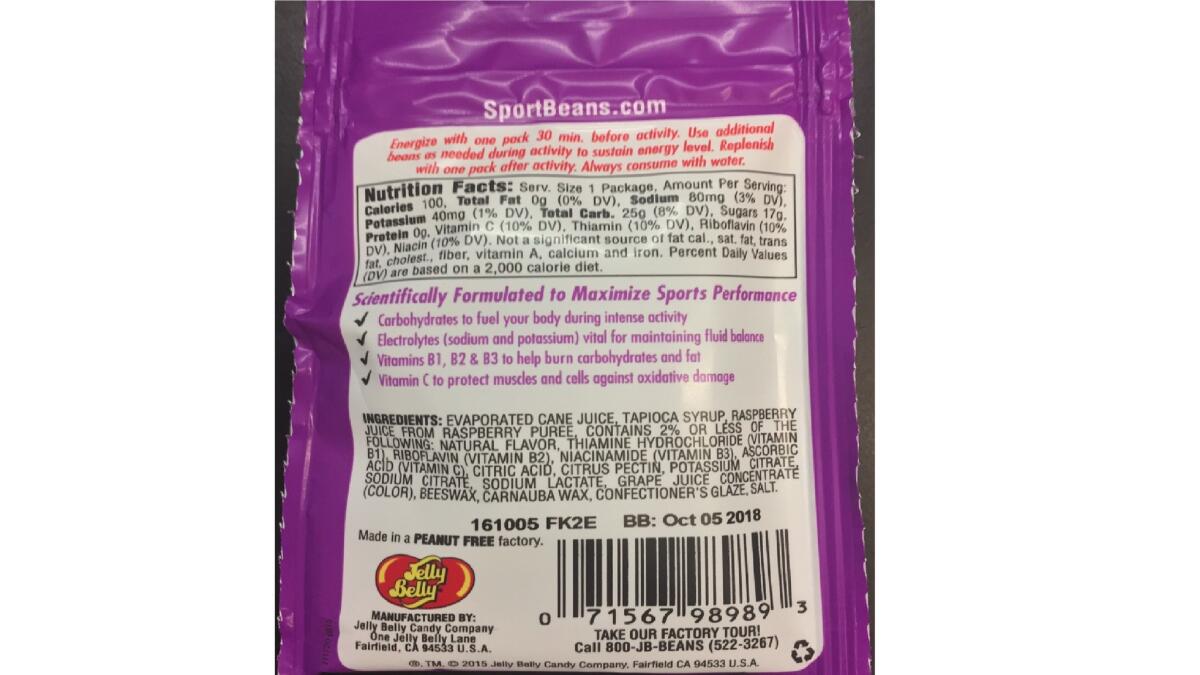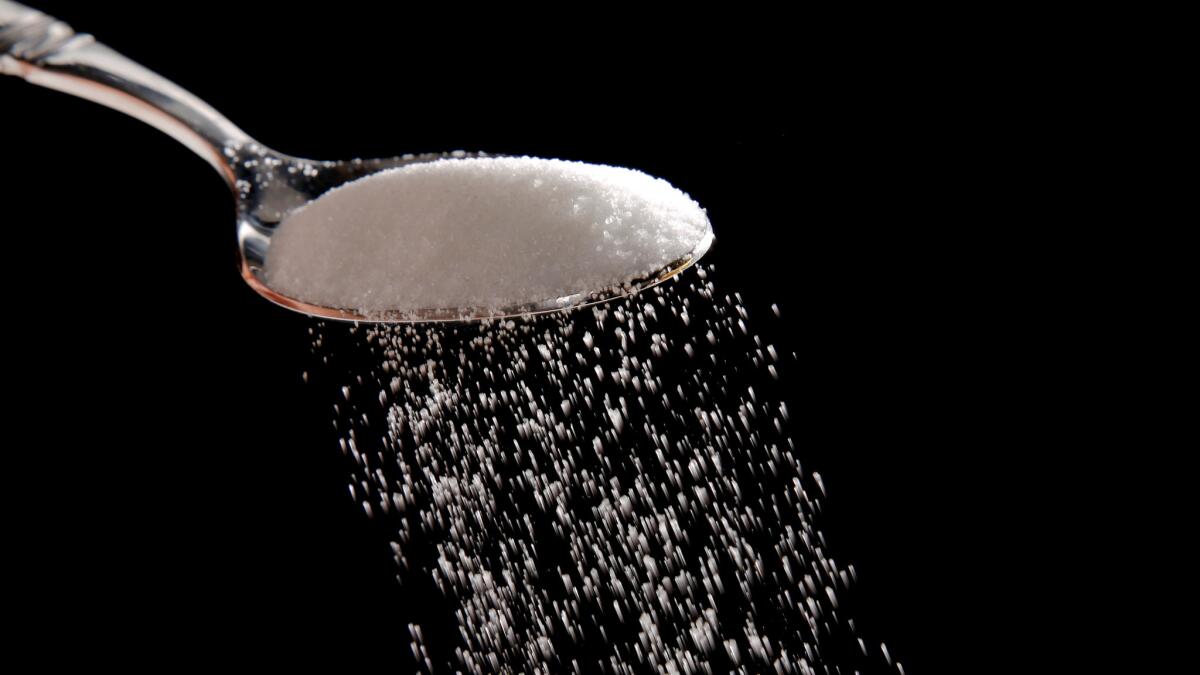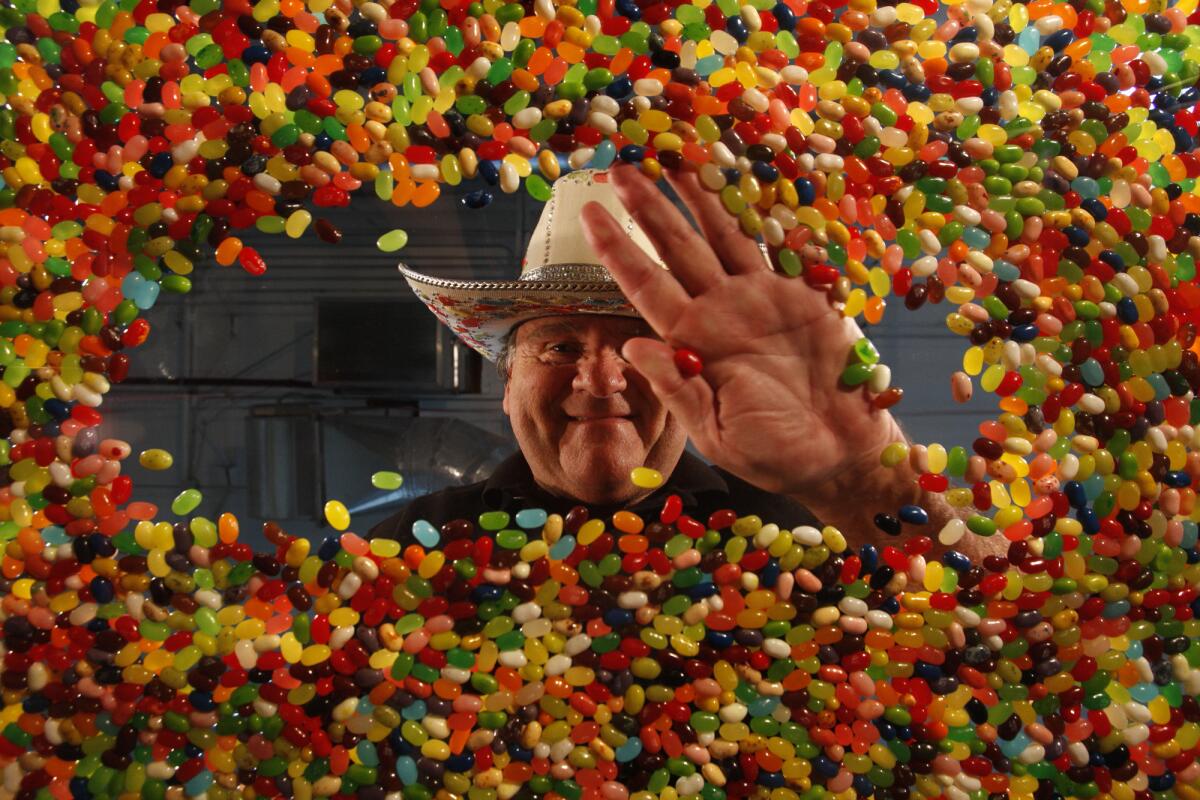California woman sues Jelly Belly Candy claiming beans were full of sugar
A San Bernardino County woman has filed suit against the Jelly Belly Candy Co. claiming that she was duped into buying and eating sugar-filled jelly beans when she thought she was devouring performance-enhancing “Sport Beans” instead.
Jessica Gomez filed a federal class-action lawsuit against the Fairfield, Calif.-based candy company in March, claiming they mislabeled sugar on the product’s list of ingredients. She is asking for damages, restitution and a court order demanding the company end “fraudulent practices.”
The lawsuit said the candy company advertises its Sport Beans products to athletes as an “energizing” sports performance aid that contains vitamins, electrolytes and carbohydrates.
But there’s a catch.
According to Gomez’s attorneys, the company lists “evaporated cane juice” as an ingredient instead of sugar “to make the product appear even more appropriate for athletes and less like a candy.”
This is a major no-no, the lawsuit said.
“By doing so, [Jelly Belly] is able to deceive its consumers, including [Gomez], regarding basic nature of the product and its contents,” her attorneys wrote in court documents.
Gomez’s attorney Ryan Ferrell said the lawsuit is not just about sugar.
“The lawsuit is about a company using an attempt at an alternative healthy term to define sugar,” he said.
Had Gomez known the product was mislabeled, the lawsuit said, she would not have purchased or paid as much for the sweet beans.

What is evaporated cane juice?
Last year, the U.S. Food and Drug Administration sought to clarify the meaning of “evaporated cane juice” since it was appearing more often on nutrition labels.
The agency issued a set of guidelines for manufacturers and declared that the ingredient was “essentially sugar.”
“FDA’s view is that such sweeteners should not be declared on food labels as “evaporated cane juice” because that term does not accurately describe the basic nature of the food and its characterizing properties,” the agency said in its guidelines.
According to the FDA, the uncommon ingredient is misleading and false because the term “juice” carries different meanings. It could mean the sweetener is “juice.” Or the ingredient was made from juice extracted from fruits or vegetables.
The FDA suggests manufacturers use simple and direct language to describe their ingredients.
Unfortunately, sugar is not simple.
There are all types of sugars, the agency notes. Sugar comes in syrups and raw form. Depending on how sweetener is processed, it can be refined sugar or molasses.
But for the purpose of labeling, the FDA says calling it “sugar” is the best way to go.

‘This is nonsense’
Jelly Belly’s response to Gomez’s lawsuit was clear: “This is nonsense.”
In court documents requesting the lawsuit be dismissed, company attorneys said Gomez’s claims are not believable. They said Gomez doesn’t indicate in her lawsuit when and where she purchased the product or if she even ate a Sport Bean. The attorneys also argued that she did not explain why the ingredient mattered to her, if she is an athlete, or that she was looking for a sugar-free product.
“No reasonable consumer could have been deceived by Sport Beans’ labeling — Gomez could not have seen “evaporated cane juice” without also seeing the product’s sugar content on its Nutrition Facts label,” the attorneys contend. “And she has pled no facts to suggest that athletes, who consume this product to sustain intense exercise, would want to avoid sugar rather than affirmatively seek it.”
Attorneys argued the company wasn’t trying to deceive consumers or hide the sugar content in its product labeling, which they said is clearly stamped on the package: Sugars 17 grams.
The lawsuit, they said, “has the look and feel of a form document to which [Gomez] has merely loaned her name.”
“If a real person named Jessica Gomez bought Sport Beans because she was truly duped, this complaint does not tell her story,” the attorneys said.
The product, which costs about $7.99 for a six-pack and comes in berry, fruit punch and lemon lime flavors, is “scientifically formulated to boost your sports performance,” according to the company’s website.
If that wasn’t enough of a sales pitch, the company says, “Jelly Belly Sport Beans and Extreme Sport Beans make fitting gifts for your running partner, gym buddy or any athlete in your life.”

What’s an added sugar?
In an effort to help consumers identify sweeteners, the
Names of added sugars
- Sugar, brown syrup, raw sugar
- High-fructose corn syrup
- Corn syrup solids
- Lactose
- Maple syrup, pancake syrup
- Dextrose
- Molasses
- Malt Syrup
- White granulated syrup
Start your day right
Sign up for Essential California for news, features and recommendations from the L.A. Times and beyond in your inbox six days a week.
You may occasionally receive promotional content from the Los Angeles Times.



